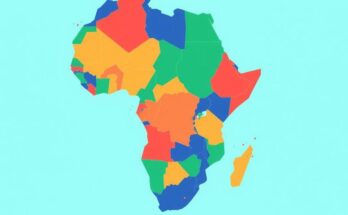Ecuador’s recent election results pose challenges for the U.S.; the leftist party, allied with former president Correa, is poised for a runoff against center-right candidate Daniel Noboa. Close voting margins indicate potential shifts in ally support, significantly influencing regional political dynamics. Failure to resolve pressing issues may facilitate a leftward turn in Ecuadorian politics, heightening concerns for U.S. interests.
The recent election results in Ecuador pose significant concerns for the United States regarding the future of democracy in Latin America. The leftist populist party, aligned with former president Rafael Correa, has secured a surprising performance, indicating a viable chance to win the impending runoff election on April 13. In the first round, Daniel Noboa, the center-right candidate, garnered 44.2% of the votes, closely followed by Correa-backed Luisa Gonzalez at 43.9%. Meanwhile, Leonidas Iza from the indigenous Pachakutik party attracted 5.3%, leaving their endorsement crucial for the runoff outcome.
Ecuador’s political landscape teeters on a pivotal decision, with implications echoing beyond its borders. Redemption of Correa’s party would likely veer the country sharply left, aligning it with regimes like those of Venezuela and Cuba. Jamil Mahuad, a former Ecuadoran president, remarked that Gonzalez is well-aligned with this movement, potentially consolidating relations with the BRICS nations led by China and Russia.
Correa, who fled Ecuador after facing prison sentences for corruption, has long harbored anti-American sentiments stemming from familial history. His administration ended the U.S. anti-narcotics base and enacted policies perceived as enabling organized crime, raising alarms about what a resurgence of his influence would mean.
Political scientist Santiago Basabe predicts Gonzalez’s favorable position in the runoff, leveraging the votes garnered by Noboa and the leftist Pachakutik party’s anticipated support. He indicated, “There is only about 10% of the vote up for grabs,” suggesting that many indigenous voters might gravitate towards Gonzalez in the next round.
Jaime Durán Barba, a political consultant, expressed surprise at Noboa’s first-round results, contrary to polls indicating a clearer lead. However, he remains optimistic about Noboa’s chances, noting that the Pachakutik constituency does not strictly adhere to conventional ideological divides, fearing a resurgence of Correa’s administration amongst indigenous voters.
Noboa faces pressing challenges in addressing rampant drug violence and an ongoing energy crisis, both paramount concerns for Ecuadorians. Achieving significant progress in these issues is critical for securing indigenous voters and garnering support from the Trump administration and allied Latin American nations. Failure to act decisively may result in Gonzalez’s victory, harkening back to the corruption and chaos of Correa’s administration whom many citizens remember fondly due to past economic boons.
The outcome of Ecuador’s upcoming runoff election is critical not only for the nation but also carries significant implications for U.S. interests in the region. The potential return of Correa’s party under Gonzalez could realign Ecuador’s political affiliations towards leftist ideologies associated with anti-American stances and organized crime issues. It is crucial for Noboa to address pressing national crises to secure support and prevent a leftward shift.
Original Source: www.miamiherald.com




